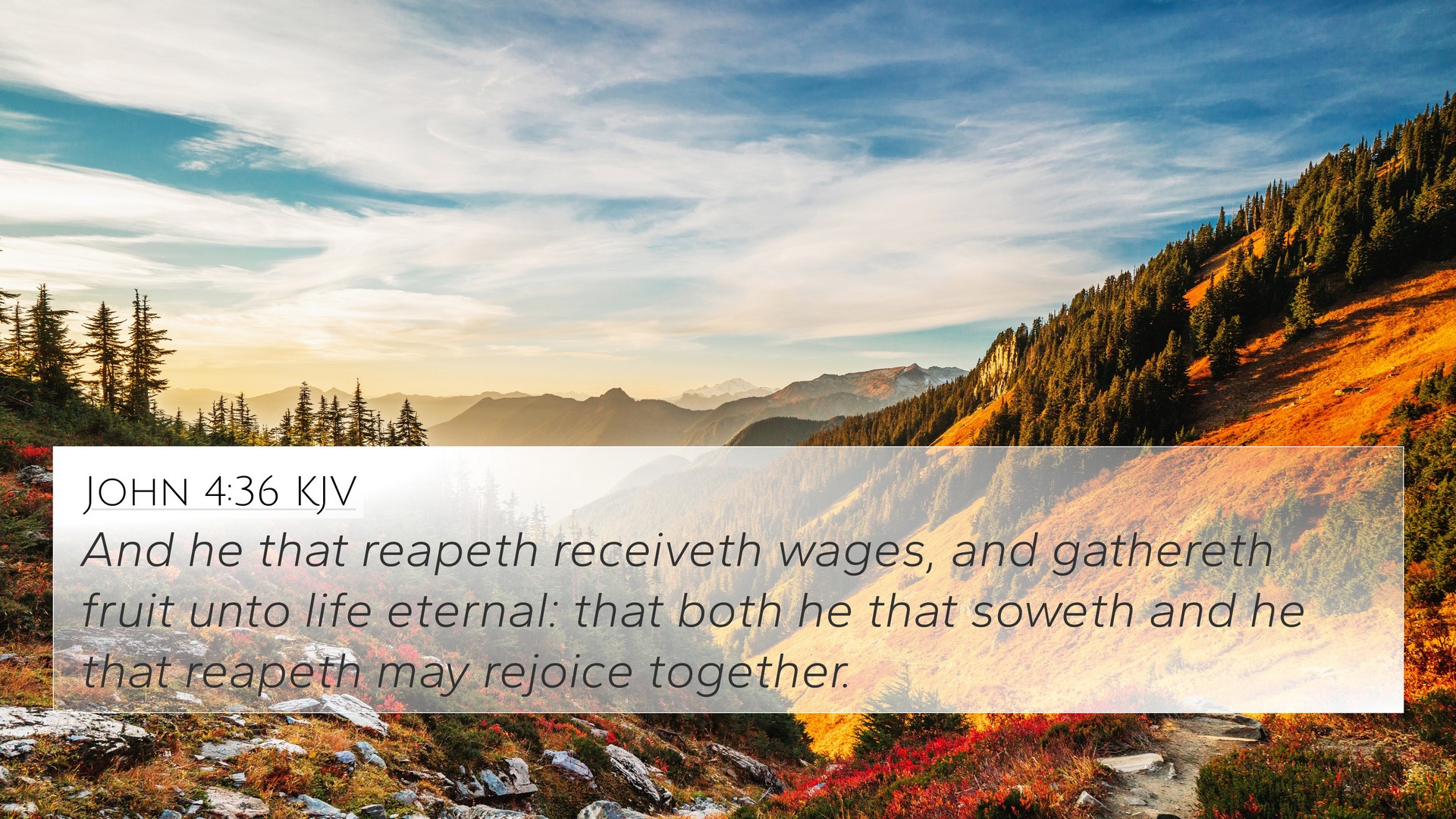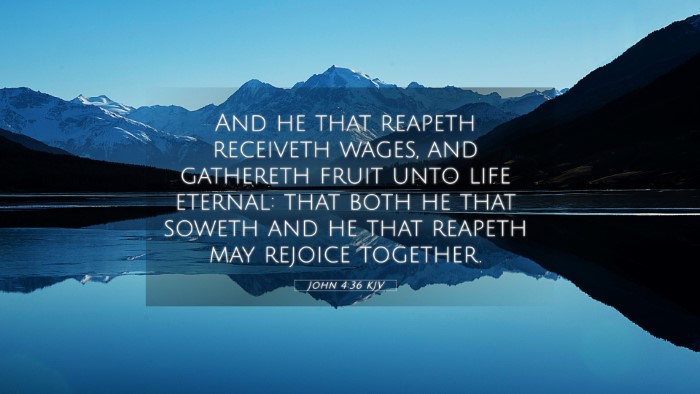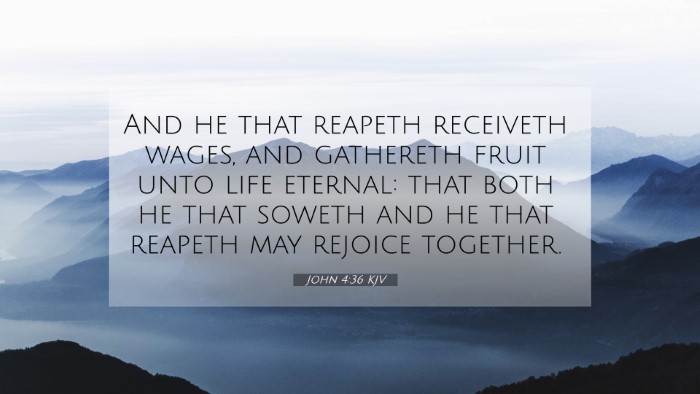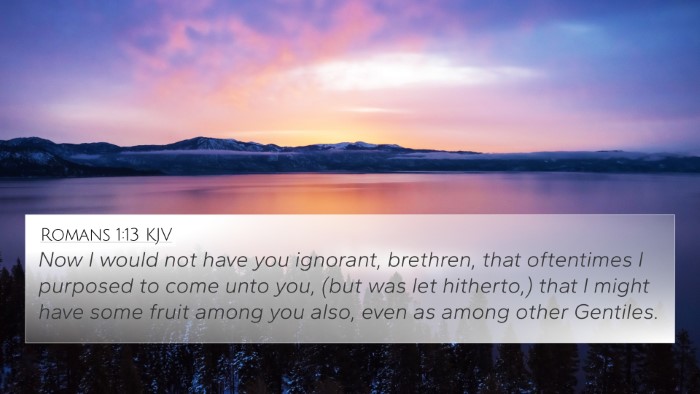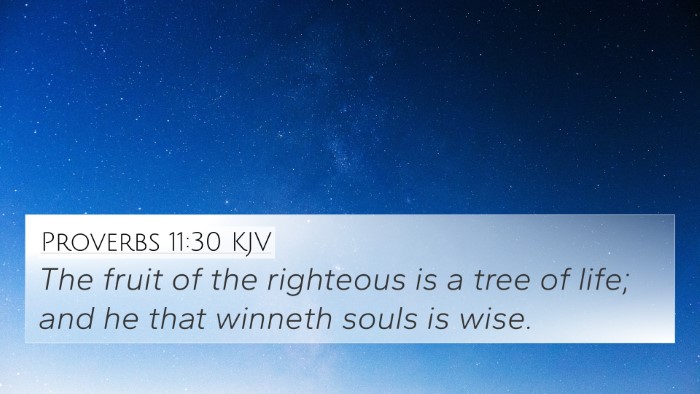Understanding John 4:36
John 4:36 states, "And he that reapeth receiveth wages, and gathereth fruit unto life eternal: that both he that soweth and he that reapeth may rejoice together." This verse highlights the significance of the labor in God's harvest and the shared joy of both the sower and the reaper. Below, we explore the meaning of this verse by incorporating insights from renowned public domain commentaries.
Summary of Insights from Commentaries
- Matthew Henry: Henry emphasizes the cooperative nature of evangelism. He notes that those who have gone before, sowing seeds of truth, and those who come later, reaping the benefits, share in the joy of seeing souls saved. This highlights the interconnectedness of the church community in sharing the Gospel.
- Albert Barnes: Barnes provides an analysis on the metaphor of reaping and sowing. He explains that the reaper receives wages for the labor he undertakes, symbolizing divine rewards for the work done in the Lord’s vineyard. The duality of this verse serves to remind believers that both evangelism and discipleship are crucial and equally rewarding.
- Adam Clarke: Clarke notes the significance of gathering "fruit unto life eternal." He asserts that this fruit represents souls brought to salvation. Clarke encourages readers to appreciate both the work of sowers and reapers, as all contribute to the larger mission of the Church and the Kingdom of God.
Thematic Connections and Cross-References
John 4:36 can be connected to numerous Bible verses that reinforce its themes of harvest, labor, and eternal rewards:
- Matthew 9:37-38: “Then he said to his disciples, ‘The harvest is plentiful, but the laborers are few; therefore pray earnestly to the Lord of the harvest to send out laborers into his harvest.’” This verse parallels the call for workers in God’s harvest and underscores the urgency to spread the Gospel.
- Galatians 6:9: “And let us not grow weary of doing good, for in due season we will reap, if we do not give up.” This emphasizes the necessity of perseverance in sharing the Gospel, echoing the rewards of both sowing and reaping.
- 1 Corinthians 3:6-8: “I planted, Apollos watered, but God gave the growth. So neither he who plants nor he who waters is anything, but only God who gives the growth.” This reinforces the collaborative aspect of ministry in which all serve crucial roles in God’s work.
- Luke 10:2: “And he said to them, ‘The harvest is plentiful, but the laborers are few. Therefore pray earnestly to the Lord of the harvest to send out laborers into his harvest.’” Similar to Matthew 9:37-38, this highlights the need for workers in the harvest field.
- Philippians 1:22: “If I am to live in the flesh, that means fruitful labor for me. Yet which I shall choose I cannot tell.” This provides insight into the joy of fruitful labor in spreading the Gospel.
- John 15:16: “You did not choose me, but I chose you and appointed you that you should go and bear fruit and that your fruit should abide.” This verse speaks to the divine appointment for bearing fruit through evangelistic efforts.
- Revelation 14:15: “And another angel came out of the temple, calling with a loud voice to him who sat on the cloud, ‘Put in your sickle, and reap, for the hour to reap has come, for the harvest of the earth is fully ripe!’” This eschatological view emphasizes the ultimate harvest at the end of time, relating closely to the eternal significance of the harvest mentioned in John 4:36.
- James 5:7: “Be patient, therefore, brothers, until the coming of the Lord. See how the farmer waits for the precious fruit of the earth, being patient about it, until it receives the early and late rains.” The patience and expectation of the farmer draw a thematic connection to the work of God’s people in the present age.
Practical Application and Conclusion
John 4:36 is intended to encourage believers in their outreach efforts. By understanding both the roles of sowers and reapers, Christians can appreciate their contributions to the evangelistic mission. As one delves deeper into cross-referencing biblical texts, this verse becomes a reminder of how interconnected scriptural truths are and their relevance to contemporary Christian life.
Utilizing tools for Bible cross-referencing and theme identification can enhance the understanding of this and related verses. By doing so, believers can engage in meaningful discussions about the fruits of their labor, the hope they share in Christ, and the eternal reward that comes from participating in the Kingdom’s work.
